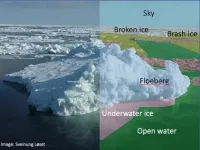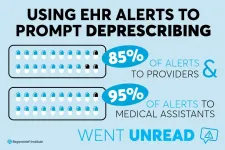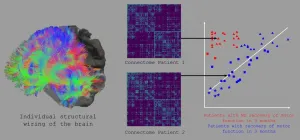(Press-News.org) If you've watched Netflix, shopped online, or run your robot vacuum cleaner, you've interacted with artificial intelligence, AI. AI is what allows computers to comb through an enormous amount of data to detect patterns or solve problems. The European Union says AI is set to be a "defining future technology."
And yet, as much as AI is already interwoven into our everyday lives, there's one area of the globe where AI and its applications are in their infancy, says Ekaterina Kim, an associate professor at the Norwegian University of Science and Technology's (NTNU) Department of Marine Technology. That area is the Arctic, an area where she has specialized in studying sea ice, among other topics.
"It's used a lot in marketing, in medicine, but not so much in Arctic (research) communities," she said. "Although they have a lot of data, there is not enough AI attention in the field. There's a lot of data out there, waiting for people to do something with them."
So Kim and her colleagues Ole-Magnus Pedersen, a PhD candidate from the Department of Marine Technology and Nabil Panchi, from the Indian Institute of Technology Kharagpur, decided to see if they could develop an app that used artificial intelligence to identify sea ice in the Arctic.
You may think there's not much difference between one chunk of sea ice and another, but that's just not so.
In addition to icebergs, there's deformed ice, level ice, broken ice, ice floes, floe bergs, floe bits, pancake ice and brash ice.
The researchers wanted the app to be able to distinguish between the different kinds of ice and other white and blue objects out there, like sky, open water and underwater ice.
Different kinds of ice really matter to ship captains, for example, who might be navigating in icy waters. Actual icebergs are nothing like brash ice, the floating bits of ice that are 2 metres in diameter or less. Think of it --the Titanic wouldn't have sunk if it had just blundered into a patch of brash ice instead of a big iceberg.
Another factor that adds urgency to the situation is climate change, which is dramatically altering sea ice as oceans warm. Even with the help of satellite images and onboard ship technologies, knowing what's in icy waters ahead can be a difficult challenge, especially in fogs or storms.
"Ice can be very difficult for navigation," Kim said. "From the water (at the ship level) It can be hard to detect where there is strong ice, multiyear ice, and different ice. Some ice is much more dangerous than other types.
The team began teaching their app's AI system using a comprehensive collection of photographs taken by another NTNU ice researcher, Sveinung Løset.
But an AI system is like a growing child -- if it is to learn, it needs to be exposed to lots of information. That's where turning the AI into an app made sense. Although the COVID-19 pandemic has shut down most cruise operations, as the pandemic wains, people will begin to take cruises again -- including to the Arctic and Antarctic.
Kim envisions tourists using the app to take pictures of different kinds of ice to see who finds the most different kinds of ice. And every one of those pictures helps the app learn.
"If the app is used for 'infotainment,' accuracy isn't that important," Kim said. "It can even be fun when the model makes mistakes."
As the AI learns, Kim says, the increasingly complex dataset could be taken into the classroom, where navigators could learn about ice in a much more sophisticated way.
Currently, students just look at pictures or listen to a PowerPoint presentation, where lecturers describe the different kinds of ice.
"So this could revolutionize how you learn about ice," she said. "You could have it in 3-D, you could emerge yourself and explore this digital image all around you, with links to different kinds of ice types."
The researchers are planning an AI in the Arctic workshop in September to explore AI applications in these remote areas.
"There are extreme challenges unique to the Arctic, from human activities and impacts in remote Arctic locations to Arctic data acquisition, sharing, and quality," Kim said. "We need to direct AI applications towards solving Arctic challenges that are important for the world as well as to highlight the 'black holes' or knowledge gaps and raise awareness on what does not work, needs improvements."
INFORMATION:
For more information about the workshop, see https://www.ntnu.edu/imt/aidingarctic
Reference:
N. Panchi, E. Kim and A. Bhattacharyya, "Supplementing remote sensing of ice: Deep learning-based image segmentation system for automatic detection and localization of sea ice formations from close-range optical images," in IEEE Sensors Journal, doi: 10.1109/JSEN.2021.3084556.
BINGHAMTON, N.Y. -- A million years ago, dry seasons became more frequent and forests retreated before the encroaching savanna. Meanwhile, clustered around a nearby lake, our ancient ancestors fashioned stone tools.
During the long press of years, mud and sediment in that East African lake turned to stone, trapping pollen and microscopic organisms in its lattice. Today, researchers like Kennie Leet analyze samples of these ancient sediments, known as sediment cores, to create a picture of the environment early humans called home.
A doctoral student in geological sciences, Leet is the first author ...
Researchers from University of Mannheim published a new paper in the Journal of Marketing that examines the effect of wage inequality on customer satisfaction and firm performance.
The study, forthcoming in the Journal of Marketing, is titled "Wage Inequality: Its Impact on Customer Satisfaction and Firm Performance" and is authored by Boas Bamberger, Christian Homburg, and Dominik M. Wielgos.
Irrespective of wage cuts and employee layoffs, the wages of top managers rose to record levels during the pandemic and wage inequality continues to grow worldwide. However, according to a 2015 OECD report, "wage inequality is harmful to long-term economic growth and undermines ...
The door has finally opened on screening newborn babies for pyridoxine-dependent epilepsy (PDE), a severe inherited metabolic disorder. This screening promises to enable better and earlier treatment of the disease. To identify new biomarkers that can be used in the newborn screening protocol, also known as the neonatal heel prick, researchers at the Radboud University Medical Center joined forces with scientists at the Radboud University's FELIX laser laboratory. They published their findings in The Journal of Clinical Investigation.
The discovery and identification ...
PULLMAN, Wash. - Even before the pandemic made Zoom ubiquitous, Washington State University researchers were using the video conferencing app to research a type of cannabis that is understudied: the kind people actually use.
For the study, published in Scientific Reports, researchers observed cannabis users over Zoom as they smoked high-potency cannabis flower or vaped concentrates they purchased themselves from cannabis dispensaries in Washington state, where recreational cannabis use is legal. They then gave the subjects a series of cognitive tests.
The researchers found no impact on the users' performance on decision-making tests in comparison to a sober control group but did find some memory impairments related to free ...
INDIANAPOLIS -- The vast majority of electronic health record (EHR) alerts attempting to reduce the prescribing of high-risk medications linked to dementia in older adults went unread in a study led by research scientists from Regenstrief Institute, Purdue University and Indiana University School of Medicine. The goal of the intervention was to facilitate the deprescribing of anticholinergics through both provider and patient-based alerts, however, engagement with the alerts was so low, the study team was unable to conclude if this approach could be ...
When blood flow to the brain is somehow reduced or restricted, a person can suffer what we know as a stroke (from "ischemic stroke" in medical jargon). Stroke is one of those conditions that seems fairly common. This isn't a misperception: just in Europe, there are over 1.5 million new cases each year.
Some strokes can be lethal, and when they're not they often result in serious damage to the victim's ability to move. In fact, stroke is one of the major causes of long-term disability today. Recovery can be a long and arduous road. Again, in Europe, under 15% of the patients ...
Software to help towns and cities use street-planting to reduce citizens' exposure to air pollution has been developed by researchers at the University of Birmingham.
Street planting, or 'green infrastructure', is an essential part of the urban realm, but there is a misconception that plants remove or 'soak up' a lot of pollution. Instead, planting at this scale primarily serves to redistribute pollution by changing air currents within streets and beside open roads.
Because of this, not only the position and amount of planting within a street, but also ...
Astronomers have designed and trained a computer program which can classify tens of thousands of galaxies in just a few seconds, a task that usually takes months to accomplish.
In research published today, astrophysicists from Australia have used machine learning to speed up a process that is often done manually by astronomers and citizen scientists around the world.
"Galaxies come in different shapes and sizes" said lead author Mitchell Cavanagh, a PhD candidate based at The University of Western Australia node of the International Centre for Radio Astronomy Research (ICRAR).
"Classifying the shapes of galaxies is an important step in understanding their formation and evolution, and can even shed light on the nature of the Universe itself."
Mr Cavanagh said that ...
Most common bone and joint (orthopaedic) procedures, such hip replacements and shoulder repair surgery, are not backed up by high quality evidence, mainly because of a lack of definitive trials, suggests an analysis of data published by The BMJ today.
Yet despite the lack of strong supporting evidence, some of these procedures are still recommended by national guidelines in certain situations, the findings show.
Musculoskeletal conditions affect around 1 in 4 UK adults and account for over 25% of all NHS surgical interventions at a cost of £4.76 billion each year.
National ...
Muscle relaxant drugs are largely ineffective for low back pain, despite being widely prescribed for this condition, suggests an analysis of the latest evidence published by The BMJ today.
The findings show that muscle relaxants might reduce pain in the short term, but the effect is too small to be considered clinically meaningful, and there is an increased risk of side effects.
But the researchers stress that the certainty of evidence is low and say large trials are urgently needed to resolve uncertainties around the use of these drugs for back pain.
Low back pain is a global public health problem and muscle relaxants (a broad class of drugs that include ...



